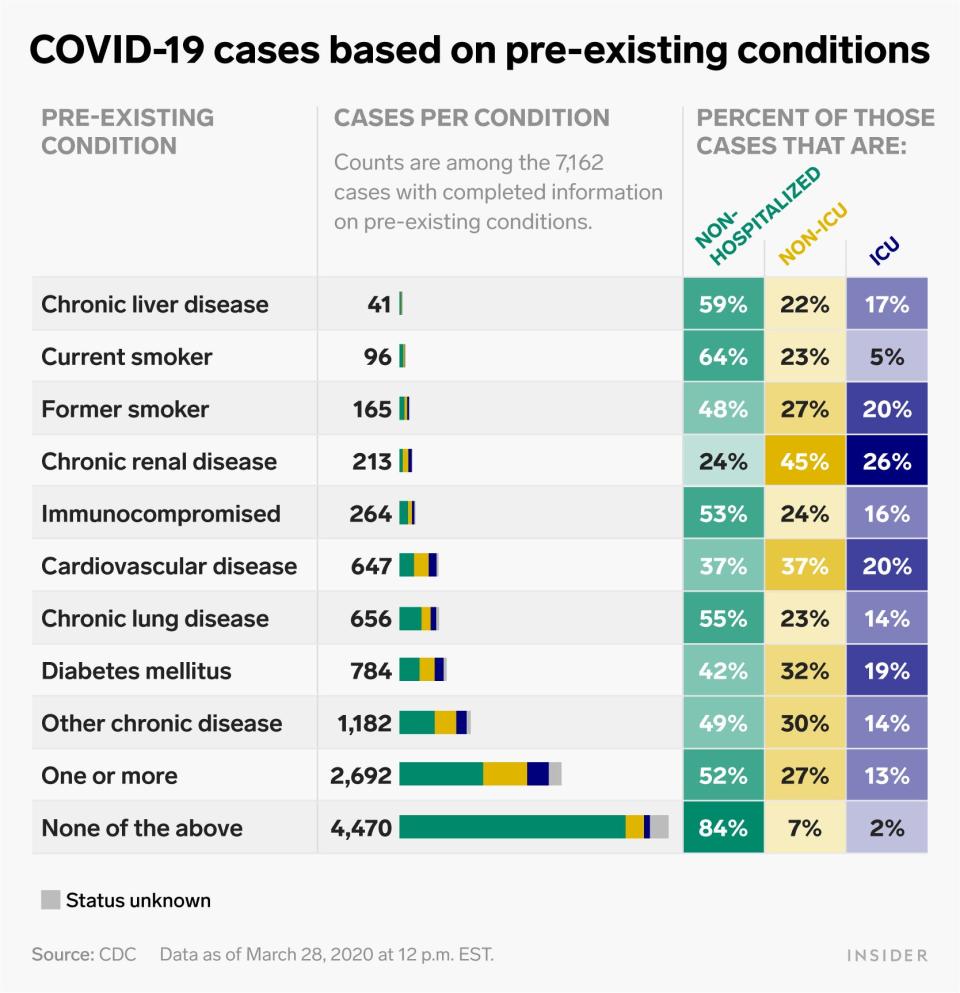More than 70% of Americans hospitalized with COVID-19 had at least 1 underlying health condition, the CDC says — here's the breakdown

Robert Nickelsberg/Getty Images
In the US, 73% of patients hospitalized with COVID-19 have had at least one underlying condition, according to a new CDC report.
People with preexisting health conditions "appear to be at a higher risk for severe disease from COVID-19" than those without, the report said.
Diabetes, chronic lung disease, and heart disease were the most commonly reported conditions among US coronavirus patients.
The CDC is still missing health information for a majority of people who tested positive for the virus, but its early findings are similar to those from China and Italy.
Among US patients hospitalized with COVID-19, 73% had at least one underlying condition, according to a new report from the Centers for Disease Control and Prevention.
"In the United States, persons with underlying health conditions or other recognized risk factors for severe outcomes from respiratory infections appear to be at a higher risk for severe disease from COVID-19 than are persons without these conditions," the report said.
As of March 28, US states and territories had reported 122,653 coronavirus cases, the report said. For the 7,162 cases in which patients' underlying health data were available, the CDC said 71% of patients hospitalized with COVID-19 and 78% of those admitted to intensive care units had preexisting conditions or risk factors. By contrast, just 27% of people who tested positive but weren't hospitalized had underlying health issues.
The most frequently reported preexisting conditions among US coronavirus patients were diabetes, chronic lung disease, and cardiovascular disease.
Here's how different health conditions correlate with hospitalization and ICU admissions among US coronavirus cases.

Business Insider/Skye Gould, data from CDC
The CDC noted that many of the conditions reported by patients are fairly common among Americans in general.
The agency also cautioned that its findings are still preliminary and that the analysis was constrained by factors like missing health data for nearly 95% of patients, as well as the limited availability of coronavirus testing, and a lack of information about longer-term outcomes of the disease.
Still, the early findings are comparable to those from countries like China and Italy, which have both seen higher rates of death and severe cases among patients with preexisting health conditions.
The Chinese Center for Disease Control and Prevention found that death rates among patients with heart disease, diabetes, chronic respiratory disease, high blood pressure, and cancer were significantly higher than the nationwide average, while Italy's National Institute of Health found that 99% of people who died from COVID-19 had at least one preexisting condition.
"Strategies to protect all persons and especially those with underlying health conditions, including social distancing and handwashing, should be implemented by all communities and all persons to help slow the spread of COVID-19," the CDC report said.
The agency recommends that anyone with an underlying health condition who experiences symptoms of COVID-19 — which often include fever, cough, and shortness of breath — should immediately contact a healthcare provider.
Read the original article on Business Insider

